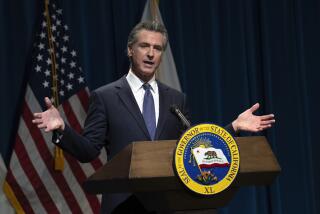Vt. Campaign Finance Law Faces Challenge
- Share via
BOSTON — A U.S. federal appeals court will hear arguments Monday on the constitutionality of Vermont’s campaign spending limits in a case that supporters of the restrictions say could have a dramatic effect on campaign financing across the country.
The case, which will be heard by a three-judge panel of the U.S. 2nd Circuit Court of Appeals in New York, comes at a time of intensified interest in campaign finance reform in the wake of the 2000 presidential and congressional elections, which cost more than $3 billion and were the most expensive in U.S. history.
Vermont’s 1998 campaign finance law limits campaign contributions and spending for statewide and legislative candidates.
It offers public financing to candidates for governor and lieutenant governor and seeks to limit so-called soft money, the large, unregulated campaign contributions by corporations and unions to political parties and advocacy groups.
The law is being contested by a diverse group, including the Vermont Right-to-Life Committee, the Vermont chapter of the American Civil Liberties Union and the Vermont Republican State Committee.
If upheld, the law would impose the first legal spending limits on candidates seeking public office since the U.S. Supreme Court held in the 1976 Buckley vs. Valeo case that such restrictions were an unconstitutional curb on free speech, said Brenda Wright of the National Voting Rights Institute in Boston, the lead council arguing the case for Vermont.
“Because of Buckley, state and local governments have been generally unwilling to enact such limits,” Wright said. “Vermont decided that the facts had changed so much that it was a good time to test whether any spending limits were allowable.”
She said that if the courts upheld the law, it could encourage other states to enact campaign spending limits.
Last August, a district judge in Vermont upheld much of the law, including its limit on campaign contributions from individuals, but it declared unconstitutional the portions of the law that limit how much can be spent by campaigns and how much can be contributed from outside the state.
Since 1976, the amount of money spent in U.S. elections has exploded.
“Vermont took the step of deciding to enact limits on spending as well as contributions because it took a look at the federal system, which tackles only contributions, and that system simply does not limit the influence of money on elections,” Wright said.
The country was ready to revisit the issue following the contested 2000 presidential election, Wright said.
“It really reinforces the need for fundamental reform,” she added.
The panel of judges will include Ralph Winters, the lawyer who successfully argued against spending limits 25 years ago in Buckley vs. Valeo.
Whichever side loses is expected to appeal, Wright said.
More to Read
Get the L.A. Times Politics newsletter
Deeply reported insights into legislation, politics and policy from Sacramento, Washington and beyond. In your inbox twice per week.
You may occasionally receive promotional content from the Los Angeles Times.










